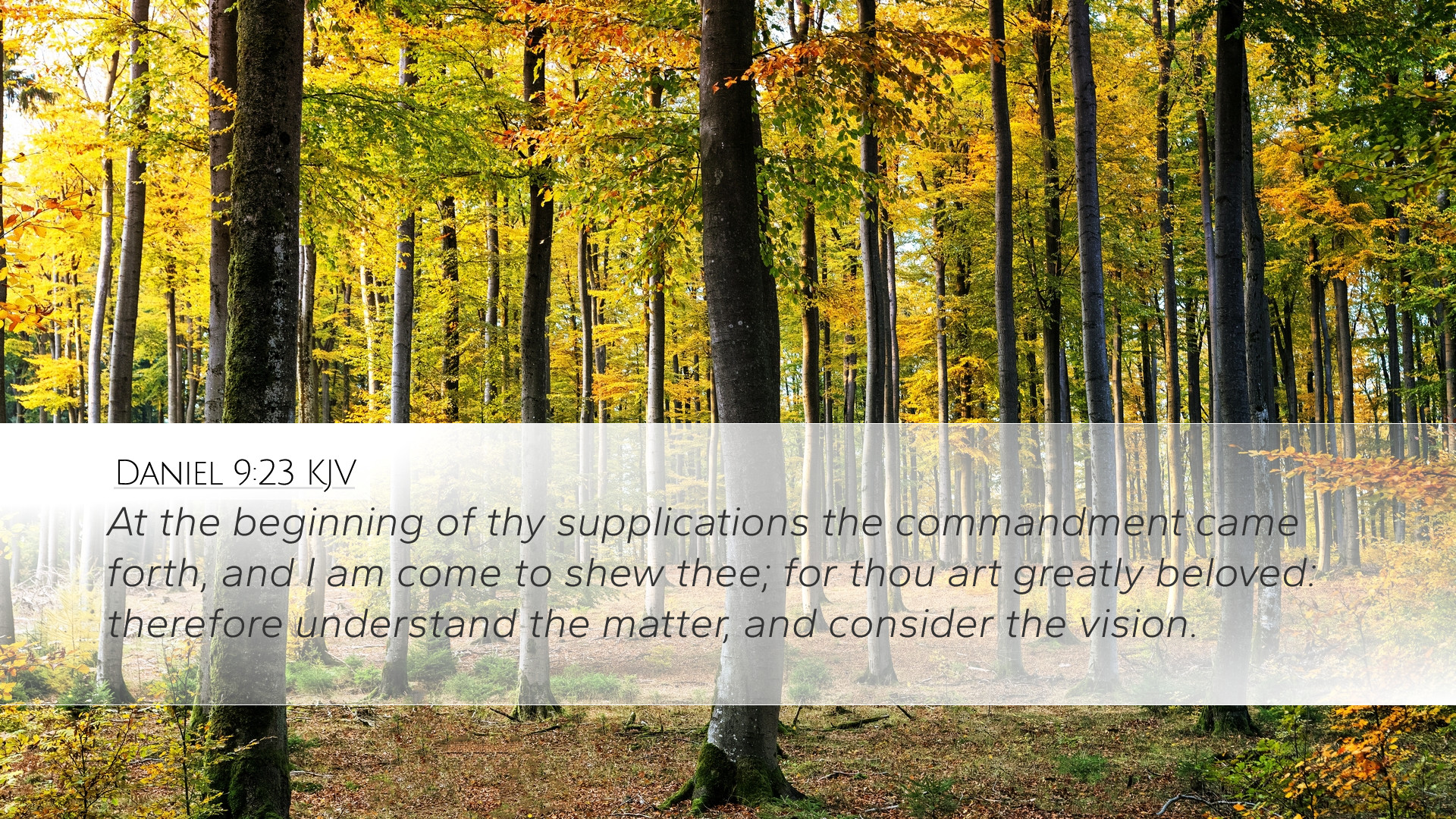Commentary on Daniel 9:23
Daniel 9:23 states: "At the beginning of thy supplications the command came forth, and I am come to show thee; for thou art greatly beloved: therefore understand the matter, and consider the vision." This verse encapsulates a critical moment in Daniel's prayer life and God's responsive communication with him. The following commentary explores various dimensions of this verse, drawing insights from public domain scholars.
The Importance of Prayer
Daniel’s supplications denote a deep-seated commitment to prayer. Matthew Henry emphasizes that prayer is not merely a duty but an expression of dependence on God. In the instance of Daniel, we see an exemplary model of a fervent seeker who turns his heart to God for understanding and guidance.
Albert Barnes elaborates that Daniel’s prayer reflects both personal and community repenting. His supplications were not for himself alone but encompassed the entire nation of Israel, showcasing the collective need for mercy and divine intervention.
Divine Response
This verse highlights the immediacy of God’s response: "the command came forth." Adam Clarke notes that God's answer was dispatched even before Daniel completed his petitions. This reveals a profound truth about God's attentiveness and the swiftly enacted divine will in response to sincere prayer.
This illustrates the principle that God is always prepared to answer those who are earnest in their petitions. Matthew Henry reminds us that, although we might not always perceive God's answers instantaneously, we can trust that He hears the cries of His people.
The Status of the Beloved
God’s designation of Daniel as "greatly beloved" is pivotal in gauging his relationship with the divine. Albert Barnes articulates that this honor denotes not just affection but also responsibility. Daniel’s exemplary conduct and faithfulness warranted such recognition, and it emphasizes the profound grace God has for those who earnestly pursue Him.
In addition, Adam Clarke remarks that being beloved signifies a special privilege of revelation. Because of Daniel’s steadfastness in prayer and submission, he is granted deeper insights into future events and the unfolding plan of God.
Calls for Understanding and Reflection
God’s command to “understand the matter, and consider the vision” indicates that comprehension of God’s will requires a thoughtful and reflective approach. Matthew Henry asserts that spiritual truths often require meditation and contemplation. Believers are urged to actively engage their minds as they seek to interpret divine revelations.
Albert Barnes further notes that understanding God's messages involves both intellectual engagement and spiritual discernment. The combination of these two aspects is crucial for anyone longing to grasp deeper spiritual insights and truths.
Theological Implications
This verse raises important theological considerations regarding God’s sovereignty and human responsibility. Matthew Henry comments on how God's providence works in conjunction with prayerful believers. Human supplication does not change God’s will, but it sets the stage for divine action in human affairs.
Adam Clarke also emphasizes that prayer is an avenue through which believers experience God's sovereign designs. God shows favor to those who seek Him earnestly, and His revelations often align with the faith and prayers of His people.
Final Words
In conclusion, Daniel 9:23 serves as a potent reminder of the importance of persistent prayer, the immediacy of God’s responses, and the intimate relationship between the believer and the Creator. Those who engage in earnest supplication can expect robust engagement from God.
As Albert Barnes encourages, we must continually reflect on God's communications and strive for a deeper understanding of His operations within and around us. Matthew Henry reminds us that our status as beloved children of God calls us into a deeper relationship characterized by prayer, contemplation, and divine revelation.


